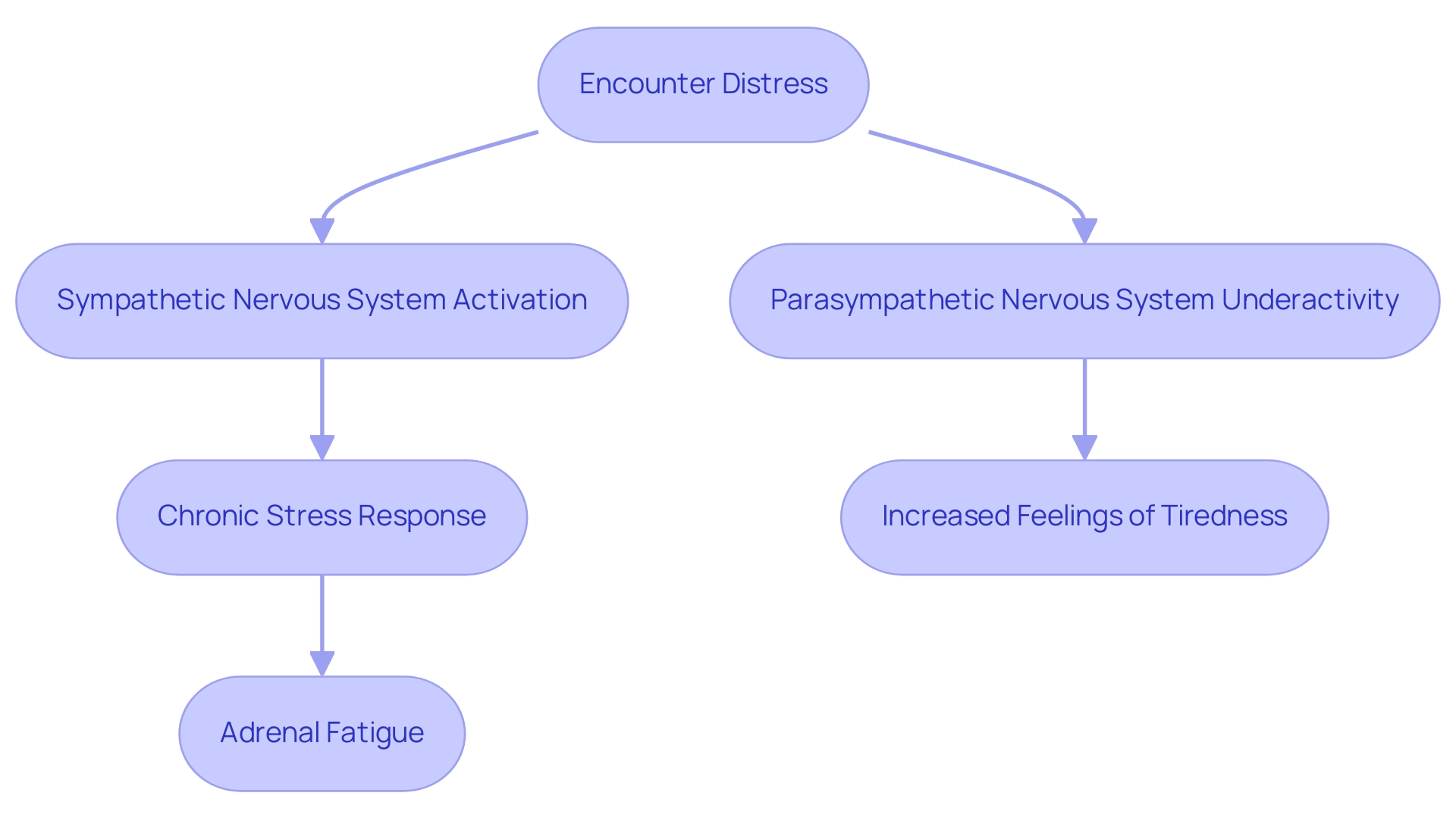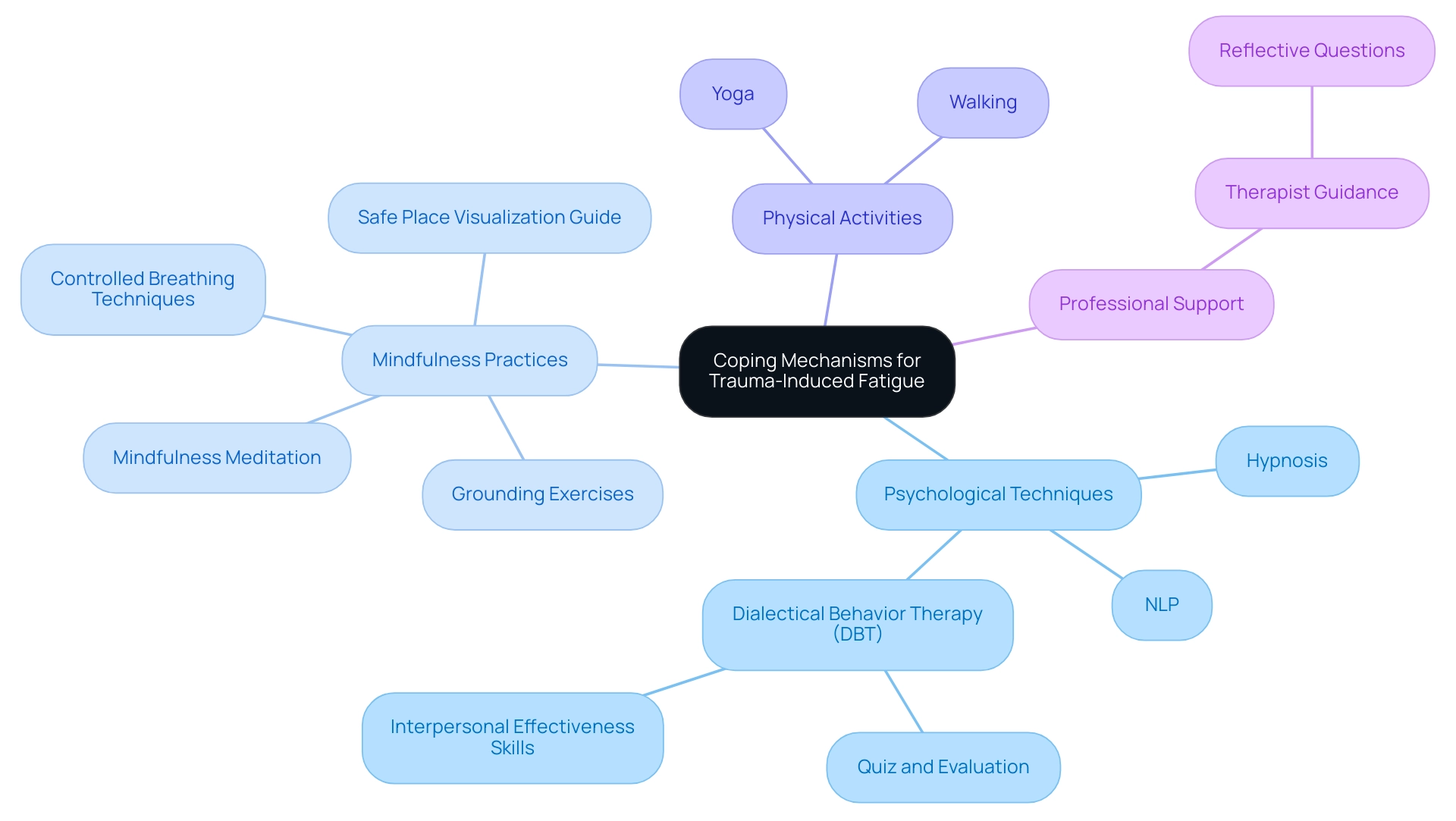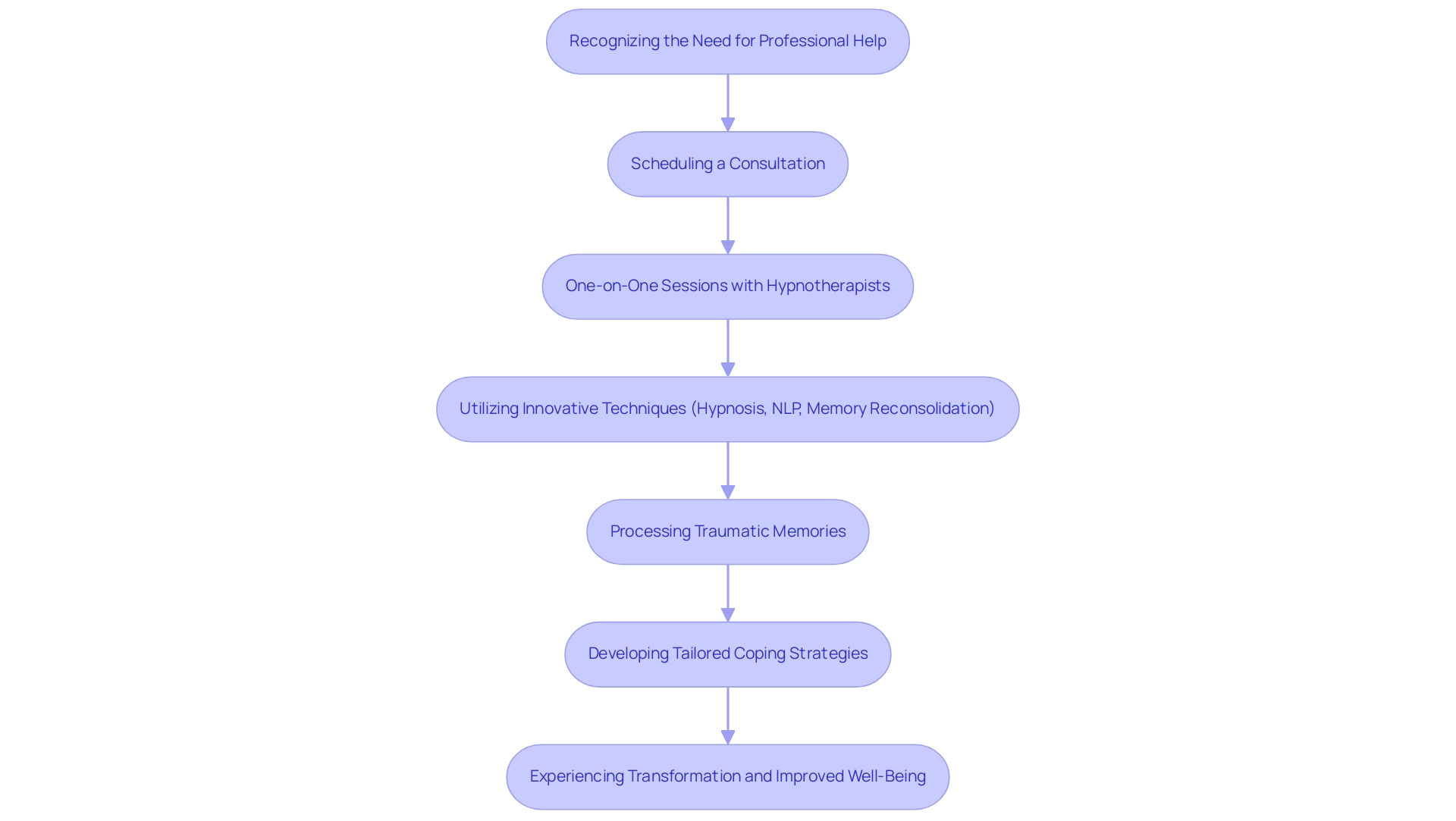PLEASE NOTE:
While the following article relates to your Google search, the services and methods at Goodwin Hypnosis may differ from those mentioned below. Since 2007, we have helped thousands of clients to overcome emotional and behavioral challenges when all else had failed. According to many of them (and their referring healthcare providers), our methods are faster than talk therapy, easier than willpower, and safer than medication. If you’re ready to resolve your issues, skip the article and visit the rest of our website, where you can learn about our unique approach, watch client testimonial videos, and discover how working with us one-on-one could be the solution you’ve been searching for.
We can help you with a variety of issues relating to emotional trauma. While we don't diagnose disorders like PTSD, we have helped hundreds of clients to overcome a wide range of traumatic experiences and their negative effects with methods that are more efficient and comfortable than CBT or EMDR. If you would like to learn more about working with us one-on-one to clear your trauma, click here.
Introduction
In a world where the echoes of past trauma often linger, understanding the profound impact of these experiences on emotional and physical well-being is crucial. Trauma, whether acute or chronic, can leave individuals feeling overwhelmed and fatigued, as their minds and bodies grapple with the aftermath of distressing events. By exploring the intricate connections between trauma and fatigue, along with effective coping strategies and therapeutic interventions, individuals can begin to navigate their healing journey.
From innovative techniques like hypnosis and NLP to the importance of professional support, this article delves into the transformative possibilities available for those seeking to reclaim their vitality and foster emotional resilience. As the journey unfolds, it becomes clear that recovery is not just a destination but a path illuminated by understanding, compassion, and the right tools for healing.
Understanding Trauma: Definition and Types
Trauma is frequently perceived as an emotional reaction to distressing occurrences or a series of overwhelming situations that can disrupt a person's ability to cope. It manifests in two primary forms:
- Acute stress, which arises from a single distressing incident—such as a car accident or assault.
- Chronic stress, which develops from prolonged exposure to stressful situations, including ongoing abuse or neglect.
Dr. Jane Smith, a clinical psychologist, defines it as 'a deeply distressing or disturbing experience that can have lasting effects on an individual's mental health.' Understanding these definitions is vital, as the essence of distress can result in varied psychological and physical reactions, such as fatigue, anxiety, and depression.
This personal narrative emphasizes the deep psychological wounds that distress can cause and the transformative effects of specific methods such as hypnosis and NLP. Our Zoom-based online emotional recovery program, led by board certified hypnotists Todd Goodwin and Gina Goodwin, offers accessible support for individuals seeking to overcome their challenges from the comfort of their homes. In fact, Zoom-based sessions are now just effective as in-person sessions, and a lot more convenient.
Recent statistics indicate that children exposed to chronic stress face a higher risk of mental health disorders, poor academic performance, and potential juvenile offenses. A 2024 study found that approximately 30% of children exposed to ongoing stress develop significant mental health issues, compared to 10% of those without such exposure.
Moreover, case studies on PTSD treatments show that therapies such as Cognitive Processing Therapy (CPT) and Eye Movement Desensitization and Reprocessing (EMDR) have effectively assisted people manage symptoms, emphasizing the significance of comprehending the various forms of distress and their implications.
By identifying these patterns and the possibility for healing through specialized programs, people can more effectively navigate their emotional landscapes and recognize the widespread impacts distress can have on overall well-being.

The Connection Between Trauma and Fatigue: Unpacking the Causes
Trauma triggers a complex interplay of physiological and psychological responses that can lead to chronic fatigue. Trauma is highly individual and can arise from various situations, including:
- Sexual assault
- Violent crimes
- The loss of a loved one
When a person encounters distress, particularly from occurrences like sexual abuse, the body enters a state of heightened alertness, often referred to as the 'fight or flight' response. This state is characterized by increased adrenaline and cortisol levels, which can be exhausting over time. Additionally, emotional distress can disrupt sleep patterns, leading to insomnia or restless nights, further contributing to feelings of exhaustion.
Psychologically, the emotional toll of distress can manifest as anxiety, depression, and intrusive thoughts, all of which require significant mental energy to manage. As a result, people may find themselves feeling persistently tired, even after adequate rest. Understanding this connection is vital for survivors, as it validates their experiences and encourages them to seek appropriate support and healing methods.
Hypnosis and NLP are effective alternatives that can help individuals address the root causes of their anxiety and panic attacks, offering a pathway to recovery and emotional relief. Many clients have shared personal testimonials that highlight the transformative benefits of these approaches in alleviating their trauma-related symptoms, paving the way for a more restful and peaceful life.
For instance, one client mentioned,
'After a few hypnosis sessions, I felt peaceful, happier, and the panic attacks are now substituted by reasoning and a calm.'
This illustrates how these methods can lead to significant improvements in managing the effects of psychological distress.

The Role of the Nervous System in Trauma-Induced Fatigue
The autonomic nervous system, which regulates involuntary bodily functions, plays a crucial role in how stress impacts fatigue. When individuals encounter distress, the sympathetic nervous system becomes activated, putting the body on high alert. This constant state of readiness can lead to chronic stress responses, exhausting the body's resources and resulting in what is known as 'adrenal fatigue.'
In individuals who have experienced distress, the parasympathetic nervous system—responsible for relaxation and recovery—often becomes underactive, which exacerbates feelings of tiredness. Comprehending this dynamic is crucial for those seeking resolution.
Our online emotional healing recovery program, available from Cary, Raleigh, Durham, and globally, is led by board certified hypnotists Todd and Gina Goodwin. Seeing all clients by Zoom, they employ hypnosis and NLP techniques to tackle these physical manifestations of distress by addressing root causes rather than merely symptoms.
We invite you to engage with our program and take the first step towards recovery.

Coping Mechanisms and Strategies for Managing Trauma-Induced Fatigue
Navigating trauma-induced fatigue requires a comprehensive approach that nurtures both the mind and body. At Goodwin Hypnosis, we utilize innovative subconscious modalities such as hypnosis and NLP, which have proven effective in alleviating anxiety and addressing the underlying psychological triggers of panic attacks.
Mindfulness meditation, grounding exercises, and controlled breathing techniques are essential tools that activate the parasympathetic nervous system, fostering relaxation and reducing stress. Evidence indicates that participating in regular physical activities, such as walking or practicing yoga, not only enhances mood but also increases energy levels, providing a crucial counter to the lethargy often faced by survivors.
As reported by Maria, incorporating mindfulness into her routine led to improved concentration and a remarkable increase in her soccer performance, where she scored more goals, illustrating the transformative power of these practices. Furthermore, testimonials from clients like Gabriela and Oscar indicate that the rapid intervention provided through our private sessions can lead to significant breakthroughs, often surpassing traditional therapy methods.
If you think that emotional distress is the cause of your stress, we encourage you to reach out and collaborate with us privately, as this is the most effective and rapid intervention. The United States Department of Homeland Security emphasizes that when practicing mindfulness, it’s important for clients to reflect on their new experiences, guided by questions from the therapist, highlighting the necessity of professional guidance in this journey.
Professional support through therapies like Dialectical Behavior Therapy (DBT) can equip individuals with tailored strategies to effectively process distress and combat fatigue. The inclusion of a quiz and evaluation on DBT for Trauma offers a structured way to understand its role in coping strategies. Furthermore, resources such as the Safe Place Visualization Guide can assist clients in creating a peaceful mental sanctuary that strengthens resilience.
By embracing these coping mechanisms and the supportive environment at Goodwin Hypnosis, individuals who have experienced hardship can gradually reclaim their vitality and cultivate a renewed sense of emotional balance.

The Importance of Seeking Professional Help
Navigating the complexities of trauma and its effects on fatigue can be overwhelming, and seeking professional help through personalized one-on-one sessions can be a vital part of the healing process. At Goodwin Hypnosis, our experienced hypnotists utilize innovative techniques such as hypnosis, NLP, and memory reconsolidation to help clients explore their experiences and develop tailored coping strategies. Our methods aid in processing traumatic memories, diminishing their intensity and enabling people to regain control over their lives.
Hypnotherapy specifically assists in accessing subconscious patterns that may contribute to fatigue, allowing for deeper emotional healing. By recognizing the importance of professional support, individuals can take proactive steps towards recovery and an improved sense of well-being, as many of our clients have experienced significant transformations in their mental health.
For example, one client shared, 'Through the innovative techniques at Goodwin Hypnosis, I was able to completely clear the residual PTSD symptoms that had plagued me for years.'

Conclusion
Understanding the intricate relationship between trauma and fatigue is essential for those seeking to navigate their healing journey. Trauma, whether acute or chronic, can deeply affect both emotional and physical well-being, leading to persistent feelings of exhaustion and distress. By recognizing the various forms of trauma and their implications, individuals can begin to validate their experiences and seek appropriate support.
Effective coping strategies, such as the innovative techniques offered through hypnosis and NLP, provide pathways to reclaim vitality and foster emotional resilience. The role of the autonomic nervous system highlights how trauma-induced fatigue manifests, emphasizing the need for targeted interventions that address both psychological and physiological responses. Integrating mindfulness practices, physical activity, and professional support into one’s healing journey can significantly enhance recovery.
Ultimately, the journey to overcoming trauma is not a solitary path but one enriched by understanding, compassion, and the right tools. By embracing these transformative approaches and seeking professional guidance, individuals can gradually reclaim their lives, moving from a place of fatigue and distress to one of empowerment and renewed hope. Healing is indeed possible, and the support available can illuminate the way forward.




